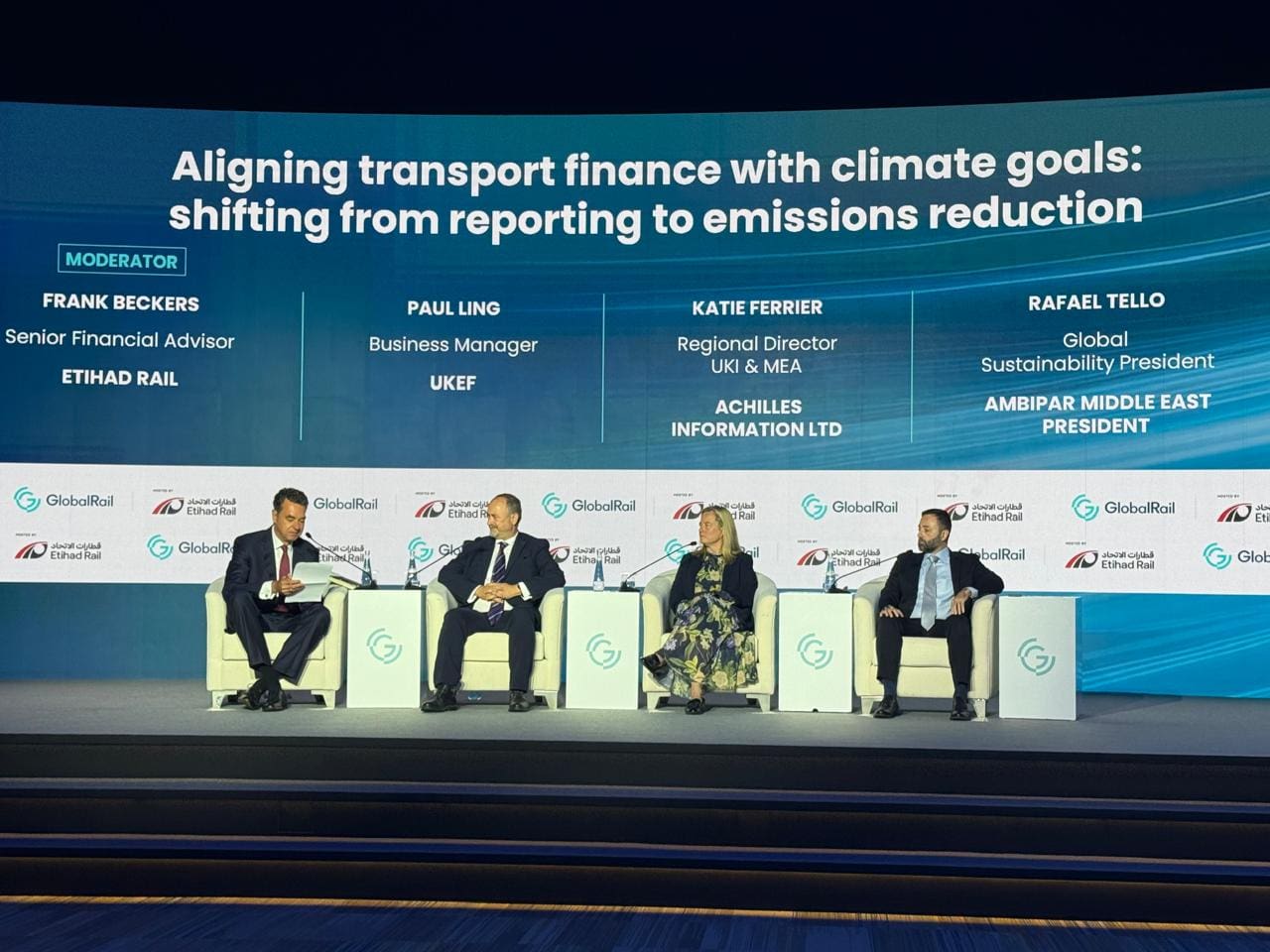Achilles calls for early integration of sustainability into rail project procurement across the GCC.
- Achilles’ Regional Director, Katie Ferrier, speaks at the Global Rail Transport Infrastructure Exhibition & Conference in Abu Dhabi on advancing UAE rail sustainability
- Discussion centred on aligning GCC climate finance with rail sector goals through credible supply chain data
- Achilles urges GCC rail developers to embed ESG principles early to attract climate-aligned investment and support Middle East rail development
- Company draws on global experience to guide regional sustainable procurement frameworks for large-scale infrastructure projects
ABU DHABI, UAE, 8 October 2025 As much as 90% of the emissions from a major rail project are generated in the supply chain, not by the client commissioning it – and collecting reliable data from a diverse mix of suppliers can be difficult.
That’s the view of Katie Ferrier, Regional Director for UKI & MEA at Achilles Information Ltd, who told delegates at the Global Rail Transport Infrastructure Exhibition & Conference in Abu Dhabi that procurement and supplier assurance now sit at the heart of credible emissions reduction.
Ms Ferrier was speaking during a panel discussion on “Aligning Transport Finance with Climate Goals: Shifting from Reporting to Emissions Reduction.” She warned that while rail has a clear role to play in meeting national climate targets, the sector still faces a credibility challenge:
“Without verifiable supply chain data, ESG claims risk being seen as greenwashing. The reputational impact of getting it wrong is huge.”
Greenwashing under scrutiny
ESG greenwashing is becoming one of the defining issues in infrastructure. Some rail operators have made measurable progress on decarbonisation, but others continue to publish reports without sufficient evidence of delivery. The financial and reputational stakes are high, with investors and the public increasingly demanding proof of impact rather than aspirational language.
Ms Ferrier stressed that the key to avoiding greenwashing allegations is robust data collection and validation. “When ESG facts replace assumptions, greenwashing ceases to be a concern,” she told the audience. “The earlier ESG is embedded in a project lifecycle, the higher the return on investment.”
For rail operators, that means embedding sustainability practices into every stage of design, construction, and operations, and ensuring that sustainable procurement policies guide supplier selection.
Lessons from global networks
Achilles brings more than three decades of supply chain management expertise to bear on this challenge. Its long-standing work in the UK rail sector, and its recent role in the TRACCS Powered by Achilles programme for Canada’s transit rail safety association, illustrate how shared supplier assurance frameworks can raise standards, eliminate duplication, and support transparency across complex networks.
Ms Ferrier argued that the GCC region, where large-scale rail is still relatively new, can benefit from these precedents. “There is no need to start from scratch. We can adapt proven approaches to ensure ESG principles are built into procurement and delivery from the outset,” she said.
Finance and policy alignment
The link between climate goals and finance was another focus of the panel. Rail projects with consistent ESG frameworks are more attractive to climate-aligned capital markets, while those with weak or inconsistent reporting face growing barriers. Policy across the GCC is still evolving, but Ms Ferrier said regional collaboration on shared sustainable supply chain standards could accelerate modal shift by building investor and passenger confidence alike.
The path forward
Ms Ferrier concluded that while the rail sector is moving in the right direction, the shift from reporting to demonstrable reduction will depend on three things: high-quality data, independent verification, and cross-industry cooperation.
“Achilles’ role is to provide the networks and assurance processes that allow projects to replace claims with evidence,” she said. “That is how rail can maintain its credibility as a driver of sustainable transport.”
UAE Contact: Gillian Arnott, General Manager Gillian.arnott@achilles.com | +971 50 717 8415

